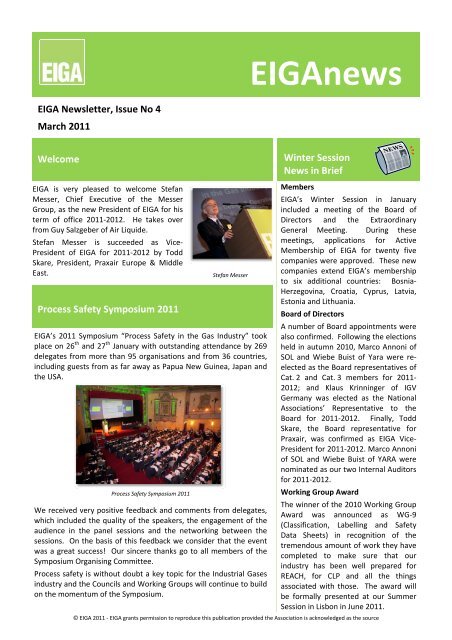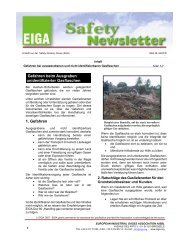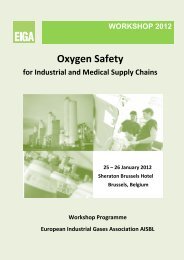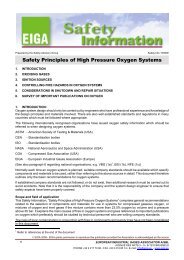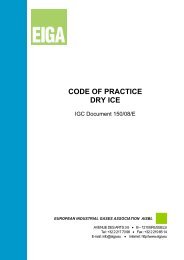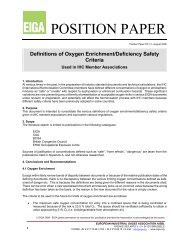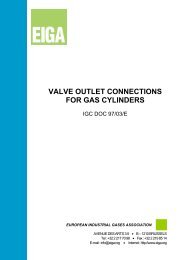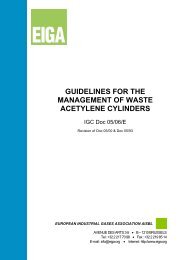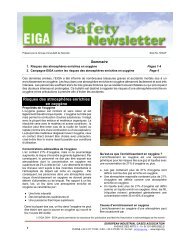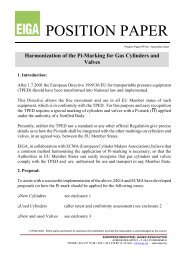downloaded - eiga
downloaded - eiga
downloaded - eiga
You also want an ePaper? Increase the reach of your titles
YUMPU automatically turns print PDFs into web optimized ePapers that Google loves.
National Associations Meeting 2010<br />
EIGA Newsletter, Issue No 4<br />
March 2011<br />
Welcome<br />
EIGA is very pleased to welcome Stefan<br />
Messer, Chief Executive of the Messer<br />
Group, as the new President of EIGA for his<br />
term of office 2011‐2012. He takes over<br />
from Guy Salzgeber of Air Liquide.<br />
Stefan Messer is succeeded as Vice‐<br />
President of EIGA for 2011‐2012 by Todd<br />
Skare, President, Praxair Europe & Middle<br />
East.<br />
Process Safety Symposium 2011<br />
EIGA’s 2011 Symposium “Process Safety in the Gas Industry” took<br />
place on 26 th and 27 th January with outstanding attendance by 269<br />
delegates from more than 95 organisations and from 36 countries,<br />
including guests from as far away as Papua New Guinea, Japan and<br />
the USA.<br />
Process Safety Symposium 2011<br />
Stefan Messer<br />
We received very positive feedback and comments from delegates,<br />
which included the quality of the speakers, the engagement of the<br />
audience in the panel sessions and the networking between the<br />
sessions. On the basis of this feedback we consider that the event<br />
was a great success! Our sincere thanks go to all members of the<br />
Symposium Organising Committee.<br />
Process safety is without doubt a key topic for the Industrial Gases<br />
industry and the Councils and Working Groups will continue to build<br />
on the momentum of the Symposium.<br />
EIGAnews<br />
Winter Session<br />
News in Brief<br />
Members<br />
EIGA’s Winter Session in January<br />
included a meeting of the Board of<br />
Directors and the Extraordinary<br />
General Meeting. During these<br />
meetings, applications for Active<br />
Membership of EIGA for twenty five<br />
companies were approved. These new<br />
companies extend EIGA’s membership<br />
to six additional countries: Bosnia‐<br />
Herzegovina, Croatia, Cyprus, Latvia,<br />
Estonia and Lithuania.<br />
Board of Directors<br />
A number of Board appointments were<br />
also confirmed. Following the elections<br />
held in autumn 2010, Marco Annoni of<br />
SOL and Wiebe Buist of Yara were re‐<br />
elected as the Board representatives of<br />
Cat. 2 and Cat. 3 members for 2011‐<br />
2012; and Klaus Krinninger of IGV<br />
Germany was elected as the National<br />
Associations’ Representative to the<br />
Board for 2011‐2012. Finally, Todd<br />
Skare, the Board representative for<br />
Praxair, was confirmed as EIGA Vice‐<br />
President for 2011‐2012. Marco Annoni<br />
of SOL and Wiebe Buist of YARA were<br />
nominated as our two Internal Auditors<br />
for 2011‐2012.<br />
Working Group Award<br />
The winner of the 2010 Working Group<br />
Award was announced as WG‐9<br />
(Classification, Labelling and Safety<br />
Data Sheets) in recognition of the<br />
tremendous amount of work they have<br />
completed to make sure that our<br />
industry has been well prepared for<br />
REACH, for CLP and all the things<br />
associated with those. The award will<br />
be formally presented at our Summer<br />
Session in Lisbon in June 2011.<br />
© EIGA 2011 ‐ EIGA grants permission to reproduce this publication provided the Association is acknowledged as the source
Winter Session Safety Awards<br />
Company Safety Awards<br />
The Winter Session saw the announcement and presentation of the<br />
2010 Company Safety Awards. These awards are based on the lowest<br />
lost time accidents rates reported over the twelve months from<br />
October 1 st , 2009 to September 30 th , 2010, for each category of EIGA<br />
membership.<br />
The awards went to Praxair Europe in Category 1, Air Products France<br />
in Category 2 and Air Liquide Maroc in Category 3.<br />
Todd Skare of Praxair, Graham Rhodes<br />
of Air Products and Youness Azrib of Air<br />
Liquide Morocco receive the Company<br />
Awards 2010 from Stefan Messer, EIGA<br />
President.<br />
Road Safety Awards<br />
The EIGA Annual Road Safety Awards are presented to the companies<br />
with the lowest preventable road vehicle accident frequency rate in<br />
their appropriate category of the Road Safety Award. The 2010 award<br />
is based on statistics from October 1 st , 2009 to September 30 th , 2010.<br />
The awards went to Linde AG for Bulk Vehicles driven more than 5<br />
million km annually; ACP Belgium for Bulk Vehicles driven between 1<br />
million and 5 million km annually; Rivoira for Cylinder Vehicles driven<br />
more than 2 million km annually; and Air Liquide Gas AB for Cylinder<br />
Vehicles driven between 0.5 million and 2 million km annually.<br />
Peter Stocks of Linde, Rik Timmermans<br />
of ACP Belgium, and Guy Salzgeber of<br />
Air Liquide receive the Road Safety<br />
Awards 2010 from Stefan Messer, EIGA<br />
President. Todd Skare received the<br />
award for Rivoira.<br />
Winter Session<br />
News in Brief<br />
Environmental Award 2010<br />
Two winners of the 2010<br />
Environmental Award were announced.<br />
This award recognises best<br />
environmental practice in EIGA<br />
member companies. 14 high quality<br />
nominations were received and from<br />
these, two projects were selected for<br />
awards. The first, in the category of<br />
Applications, was awarded to Sapio<br />
Produzione Idrogeno Ossigeno, in Italy<br />
for their project ‘Soilution’, an<br />
innovative “in situ” remediation<br />
technology for groundwater and soil<br />
contaminated with Chromium VI. The<br />
second, in the category of Operations ‐<br />
environmental improvements that have<br />
been made on one of our member’s<br />
production sites went to BOC Gases Ltd<br />
Morden, UK for their environmental<br />
team’s ‘Rising to the Challenge’ project<br />
on environmental communication and<br />
awareness.<br />
The Environmental Award will be<br />
formally awarded at the Summer<br />
Session in June. Full details of these<br />
projects and some of the other notable<br />
ones will be covered in an<br />
Environmental Newsletter to be<br />
published by WG‐5 (Environment) in<br />
the next few months.<br />
2013<br />
2013 may seem a long way off, but it is a<br />
significant year for both EIGA and the<br />
Compressed Gas Association in the<br />
United States. 2013 marks the 90 th<br />
anniversary of the founding of EIGA’s<br />
predecessor, CPI, and it is also the 100 th<br />
anniversary of the founding of CGA. To<br />
help mark the EIGA anniversary, we are<br />
starting to gather items that originate<br />
from the year we were founded. For<br />
example we have some member<br />
companies looking out for cylinders from<br />
1923! If any members have any items<br />
from 1923 that they would like to share<br />
with us for 2013, then let Andy Webb<br />
know at a.webb@<strong>eiga</strong>.eu.<br />
© EIGA 2011 ‐ EIGA grants permission to reproduce this publication provided the Association is acknowledged as the source
Human Reliability – Human Failures<br />
If we analyse the causes of the Lost Time Incidents and Recordable<br />
Injuries reported by member companies in the Work Injury Statistics<br />
(WIST) database, approximately 50‐60% have been reported as<br />
‘human errors’. If we, as an industry, are going to continue to<br />
improve our safety performance, we need to tackle the causes of<br />
these incidents by focusing on the underlying human factors and safe<br />
behaviours that result in these ‘human errors’. To support that<br />
objective, the Safety Advisory Council (SAC) will be changing the<br />
classification of “Human error” in future incident reporting to better<br />
identify and understand these contributing factors and improve the<br />
value of safety statistics in helping to develop programmes to reduce<br />
incidents in the industry.<br />
EIGA document 904/11 “Work Injury Statistics” will be reissued in the<br />
next few weeks. This 2011 revision aligns the document completely<br />
to the WIST Platform. In particular, Appendix 1E has been<br />
substantially updated to separate the “Human error” classification<br />
into seven categories of “Human failure” so as to better record the<br />
outcome of human factor analysis in investigations. The new<br />
classifications are:<br />
� Human failure ‐ Skill Based Error<br />
� Human failure ‐ Mistake<br />
� Human failure ‐ Unintended violation<br />
� Human failure ‐ Situational violation<br />
� Human failure ‐ Organisational benefit violation<br />
� Human failure ‐ Personal benefit violation<br />
� Human failure ‐ Reckless violation<br />
A further Appendix 2 has been added to the document to provide<br />
further descriptions and examples of each type of human failure.<br />
The WIST platform is being updated to allow Q1 2011 incident reports<br />
to be entered using one of these new classifications in addition to the<br />
existing causes. SAC are also producing a Human Factors Safety<br />
Information Sheet on “Human Reliability and Human Failure“ in<br />
support of this.<br />
Transport Legislation Issues<br />
Tunnels<br />
Many of you will be aware of the restrictions placed on some tunnels<br />
where ADR is applied. This impacts many EIGA members, and so an<br />
Ad‐Hoc Group of the Transport Working Group (WG‐1) was formed to<br />
look at the issues. To try and understand what could be done to<br />
change the classification of class 2 products in the tunnel categories,<br />
representatives of the Ad‐Hoc Group met with one of the agencies<br />
involved in the original work that set the restrictions. From this<br />
meeting, it does not appear that anything can be done in the short<br />
term to make a change to the categories or the classification, and that<br />
this may have to be looked at a National level. The Ad‐Hoc Group will<br />
be meeting shortly to review what the next actions EIGA and the<br />
National Associations could take.<br />
News in Brief<br />
EU Commission Propose Revision to<br />
Seveso Directive<br />
At the end of December 2011, the<br />
Commission (DG Environment) adopted<br />
a proposal to revise the Seveso II<br />
Directive (Proposal for a Directive of the<br />
European Parliament and of the Council<br />
on the control of major accident hazards<br />
involving dangerous substances). The<br />
new rules in the Proposed Directive<br />
would apply from June 1, 2015.<br />
Discussions in the European Parliament<br />
and the EU Council on the proposal will<br />
take place during 2011.<br />
EIGA has established an Ad Hoc Group to<br />
review the proposed directive. The issue<br />
of increasing the threshold for hydrogen<br />
(see Position Paper PP‐29) was<br />
acknowledged by the Commission and<br />
the options presented and discussed in<br />
the impact assessment document that<br />
accompanied the Proposed Directive.<br />
The decision of the Commission is that<br />
“...at this stage the preferred option is to<br />
leave the threshold unchanged, although<br />
it should be recognised that appropriate<br />
risk management may be required<br />
should the hydrogen economy develop<br />
in the longer‐term.” The most significant<br />
proposed changes to Seveso II are:<br />
� Alignment of the definitions of<br />
substances falling within the scope of<br />
the Directive with the EU system of<br />
classification of dangerous<br />
substances (CLP), to which it now<br />
refers. There is also a new process to<br />
handle substances with hazards that<br />
are not reflected in CLP.<br />
� Alignment of provisions relating to<br />
the public’s access to safety and<br />
environmental information with<br />
existing EU Directives on this access,<br />
with the intention of making access<br />
to information and participation in<br />
decision simpler.<br />
� Introduction of the concept of safety<br />
culture, and stricter standards for<br />
inspections of installations to ensure<br />
the effective implementation and<br />
enforcement of safety rules.<br />
© EIGA 2011 ‐ EIGA grants permission to reproduce this publication provided the Association is acknowledged as the source
Telematics<br />
Telematics is a subject that some of you will be familiar with, but for<br />
those that are not it is the integrated use of telecommunications and<br />
informatics, and it is becoming an area of increasing interest in many<br />
areas. One of these areas is the transport of dangerous goods, where<br />
at the joint meeting of RID/ADR/ADN a working group has been<br />
established to consider what the requirements should be for the<br />
transport of dangerous goods and Telematics. There is much<br />
discussion on what is important for the transport of dangerous goods<br />
as whilst it is possible to gather significant quantities of information<br />
from vehicles, deciding what is important to avoid overloading the<br />
information infrastructure is important. Also, to complicate matters,<br />
there is much work being done across Europe and ensuring a<br />
coordinated approach seems to be one of the greatest challenges.<br />
There are a number of trials in place across Europe, but we do seem<br />
to be a long way from a Europe wide system. EIGA will continue to<br />
participate in this area as it does seem that one day we will have a<br />
European wide system of tracking some or all dangerous goods.<br />
HyCO and the ETS<br />
Over the last two years, the Regulatory Environment Council (REC)<br />
and its HyCO Benchmarking Task Force has taken important steps in<br />
ensuring equality of treatment for outsourced HyCO plants.<br />
In line with the EU Directive, HyCO plants will come within the EU’s<br />
Emissions Trading System (ETS) from 2013, and will need to surrender<br />
EU Allowances (EUAs) for carbon dioxide emissions. Each EUA<br />
represents one tonne of carbon dioxide emission.<br />
It is therefore important that members’ plants (outsourced) be<br />
treated the same as “captive” or “insourced” alternatives and the<br />
need for equality in terms of the free EUAs provided by the relevant<br />
authorities, in partial recompense for EUAs required to be<br />
surrendered, becomes critical.<br />
� The work done to date has involved several critical, and<br />
successful, advocacy steps. For example, “Recital 23” to the<br />
Directive established principle of equality for outsourcing and<br />
HyCO plants were added to the “exposure to carbon leakage” list,<br />
the same as EIGA members’ large energy‐intensive customers.<br />
� Further, for benchmarking of HyCO plants (on which the free<br />
allocation of EUAs will be based), we achieved Commission<br />
agreement on benchmarks that will avoid costly data‐gathering<br />
effort on part of members and in practice will represent equality<br />
with the “captive” or “insourced” alternatives of our members’<br />
customers.<br />
� Throughout the process, REC and Task Force members have<br />
maintained close and productive relationships with other industry<br />
associations such as Concawe and Europia, who represent the oil<br />
refining industries, and Cefic.<br />
Continued over/<br />
Publications news<br />
Carbon Dioxide Physiological Hazards ‐<br />
“Not just an asphyxiant!"<br />
The Safety Advisory Council (SAC) has<br />
prepared a new Safety Information (SI<br />
24/11) publication about the<br />
physiological hazards of carbon dioxide.<br />
While the asphyxiation hazard is well<br />
known, carbon dioxide intoxication<br />
hazard is not well understood by those<br />
involved in the supply and/or use of<br />
carbon dioxide.<br />
SAC have received reports about serious<br />
incidents involving carbon dioxide (CO2).<br />
Tragically, some have resulted in<br />
fatalities. A common cause in these<br />
incidents has been a failure to recognise<br />
the actual carbon dioxide concentration<br />
in the working environment and<br />
therefore the hazard.<br />
This SI is intended to raise awareness of<br />
the hazards of carbon dioxide<br />
intoxication, to educate people on the<br />
mechanism of intoxication and to<br />
highlight the risks of mistakes when<br />
analysing ambient air. The SI makes<br />
recommendations on what steps should<br />
be taken to minimise these risks.<br />
Pierre Wolfs – 20 years with EIGA<br />
We are very pleased to congratulate<br />
Pierre Wolfs who this year celebrates 20<br />
years of close association with EIGA.<br />
Pierre was first seconded to EIGA as<br />
Deputy General Secretary from January<br />
1 st , 1991 until August 31 st ,1995. He was<br />
seconded again to EIGA as Technical<br />
Manager in January 2005 until March<br />
2009 and since then has been EIGA’s<br />
Technical Director.<br />
Pierre has been influential in the<br />
development of standards, legislation<br />
and regulations relating to the transport<br />
of our products; he was a member of<br />
WG‐1 (Transport) from 1988 to 2005,<br />
including a period as Chairman, and was<br />
a consultant for CEN on the TPED<br />
standards from 1997 to 2006. Since<br />
2005 he has also guided the industry’s<br />
involvement in REACH and CLP.<br />
© EIGA 2011 ‐ EIGA grants permission to reproduce this publication provided the Association is acknowledged as the source
HYCO and the ETS continued<br />
The next steps on free allocation of EUAs to HyCO plants is to review<br />
and comment on the draft guidelines that are due to be finalised by<br />
the Commission in 2011 and thereafter to ensure that the equality<br />
won for outsourced and insourced plants is maintained as the EU<br />
“Decision” is implemented by Member States.<br />
In summary and looking at the broader context of the work done by<br />
REC, the “Decision” represents a significant success for HyCO, but this<br />
needs to be managed through the next phases of implementation.<br />
Other ETS‐related issues will continue to require REC’s attention,<br />
including Measuring and Reporting Guidelines with respect to<br />
transferred carbon dioxide and possible financial compensation for<br />
large “indirect emitters” including large electricity consumers such as<br />
ASUs.<br />
Throughout this work EIGA has adopted two overriding advocacy<br />
positions that have served us well so far and should continue to serve<br />
us well ‐ equality for outsourcing and avoidance of market distortions.<br />
Publication News<br />
The following publications have been issued recently and can be<br />
<strong>downloaded</strong> from the EIGA website:<br />
Position Papers:<br />
Position Paper PP‐33 ‐ Indirect Carbon Dioxide Emissions<br />
Compensation: Benchmark Proposal for Air Separation Plants.<br />
Briefing Notes (in Members Area):<br />
Briefing Note BN‐11 ‐ Benchmarking: Air Separation Plants and<br />
Indirect Carbon Dioxide Emissions.<br />
Safety Information:<br />
Safety Info 24/11 ‐ Carbon Dioxide Physiological Hazards ‐“Not just<br />
an asphyxiant!”<br />
Documents:<br />
IGC Doc 57/11 ‐ Recommendations for avoidance of sustained load<br />
cracking of aluminium alloy cylinders.<br />
IGC Doc 64/11 ‐ Use of residual pressure valves.<br />
IGC Doc 91/10 ‐ Use of pressure relief devices for gas cylinders.<br />
IGC Doc 96/11 ‐ Alternatives to hydraulic testing of gas cylinders.<br />
Training Packages (in Members Area):<br />
Training Package TP 15/10 ‐ ADR 2011 ‐ The Changes.<br />
Training Package TP 22/11 ‐ Recent Incidents in the Industrial and<br />
Medical Gases Industry (SAC 122).<br />
Training Package TP 23/11 ‐ Recent Incidents in the Industrial and<br />
Medical Gases Industry (SAC 124).<br />
EIGA Office Documents (in Members Area):<br />
EIGA 908/10 ‐ 300 bar residual pressure valve filling connectors.<br />
EIGAzette 37 ‐ January 2011.<br />
EUROPEAN INDUSTRIAL GASES ASSOCIATION AISBL<br />
Avenue des Arts 3‐5 ‐ B 1210 Brussels<br />
Tel +32 2 217 70 98 Fax +32 2 219 85 14<br />
E‐mail: info@<strong>eiga</strong>.eu Internet: www.<strong>eiga</strong>.eu<br />
Terminology and definitions<br />
Work has just begun on the revision of<br />
an International and European Standard,<br />
(EN ISO 10286) covering the terminology<br />
associated with gas cylinders. Many of<br />
you will be wondering “why do we need<br />
a standard on “Terminology”, after all a<br />
cylinder is a cylinder surely?”. Cylinders<br />
are the simple part, but when you come<br />
to terms such as test pressure and<br />
inspection bodies things start to get<br />
more difficult. Over the years, as<br />
standards have been developed, new<br />
definitions for the same term have been<br />
written into different standards. The<br />
result is that in some cases we can have<br />
three or four definitions for the same<br />
activity or process. As we are living in an<br />
ever increasingly regulated environment,<br />
this can lead to confusion and questions<br />
of interpretation, so this project has<br />
been launched to try and have a<br />
harmonised set of terms and definitions<br />
which will be used in standards and<br />
regulations. How does this impact EIGA?<br />
In the long term we will be looking at<br />
our own documents to ensure that we<br />
too are consistent, both with these<br />
international definitions as well as within<br />
our own documents.<br />
Events News<br />
EIGA Summer Session 2011: will be<br />
hosted by the Portuguese National<br />
Delegation at Cascais near Lisbon from<br />
2 nd to 3 rd June 2011. Registration is now<br />
open and details are available from the<br />
dedicated Summer Session 2011 website<br />
at www.<strong>eiga</strong>lisboa2011.com. The<br />
Session is open to EIGA members only.<br />
National Associations’ Meeting 2011:<br />
will be held at the Sheraton Brussels<br />
Hotel in Brussels on 13 th and 14 th April<br />
2011.<br />
EIGA Winter Session and Workshop<br />
2012, titled “Oxygen Safety in the<br />
Industrial and Medical Supply Chain” will<br />
be held during the Winter Session 2012<br />
in Brussels on 25 th and 26 th January.<br />
For latest information on these and<br />
other items see News at www.<strong>eiga</strong>.eu.<br />
© EIGA 2011 ‐ EIGA grants permission to reproduce this publication provided the Association is acknowledged as the source


